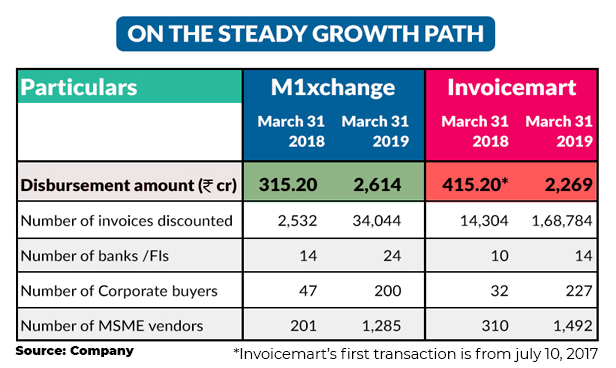
The Trade Receivable Discounting System (TreDS), an online bill discounting platform that helps cash-starved micro, small and medium enterprises (MSMEs) raise funds by selling their trade receivables to corporates, has been witnessing phenomenal growth over the last two years.
Issues licence
The concept of TReDS to facilitate the financing of trade receivables of MSMEs was introduced by the Reserve Bank of India (RBI) in 2014. Accordingly, the RBI, in 2017, issued licence to three players: Receivables Exchange of India Ltd (RXIL), a joint venture between Small Industries Development Bank of India (SIDBI) and National Stock Exchange of India Limited (NSE); Invoicemart, promoted by A Treds Ltd (a joint venture of Axis Bank and mjunction services); and M1Xchange, promoted by Mynd Solutions Private Limited.

“The TReDS platform has been growing tremendously. In FY2017-18, all three exchanges put together did business of about ₹800 crore, which has touched approximately about ₹7,000 crore in FY19, which shows the size of growth,” said Sundeep Mohindru, CEO, Mynd Solutions. He expects all three platforms to do aggregate business worth ₹25,000 to ₹30,000 crore in FY 2019-20.
“One of the distinguishing features of TReDS is that the seller (MSMEs) of receivables are not required to give any collateral, and will have no recourse to them in case of defaults,” said Kalyan Basu, MD and CEO, Invoicemart.
Invoicemart, which crossed ₹3,000 crore recently, targets to add 45 bankers/FIs and 6,500 participants (buyers and sellers), and clock ₹10,000-crore disbursement by March 2020.
The TReDS platform not only also ensures the regular flow of operational funds to MSMEs at attractive interest rates, but also ensures that their working capital limits are not affected as these are ‘off balance sheet finance’. It also helps corporates comply with the MSME Act, under which a buyer has to pay the MSME supplier within 45 days.
“Our paper work has drastically come down and we are able to save more time,” said R Selvaraj from Schnell Energy, an MSME supplier, which sells smart pump panels to CRI Pumps.
On its part, the government has taken a host of initiatives to promote the platform.
Faces headwinds
In 2017, the Central government made it mandatory for public sector undertakings (PSUs) to register on the platform. But this move has faced some headwinds. “The process of approving an invoice in itself is a long drawn process in case of PSUs,” said Mohindru. In such cases banks don’t come forward to fund the invoices, thereby negating the benefits of the scheme.
In November 2018, Prime Minister Narendra Modi announced that companies whose turnover exceeds ₹500 crore will have to be registered on the TReDS platform.
Besides, the RBI also classifies banks’ disbursement under this platform under priority sector lending (PSL). For banks, advances under this platform is classified as PSL.
“This platform gives equal business opportunity to all banks, irrespective of their size. With the vast amount of data available in the platform, banks can reach out to more customers information about whom was hitherto unavailable,” said a senior official with Karur Vysya Bank.
We are recently being covered by Business Line

